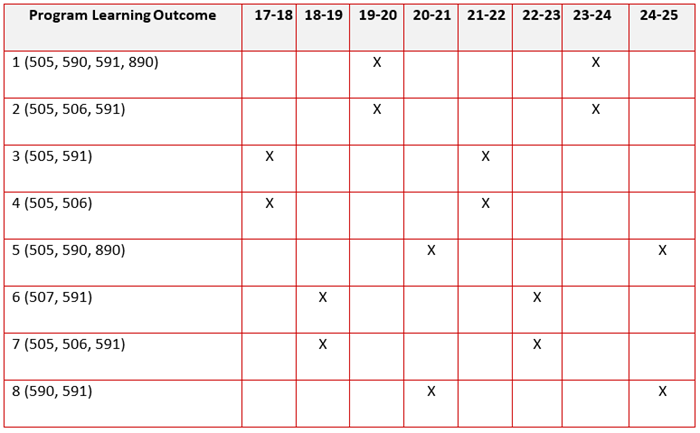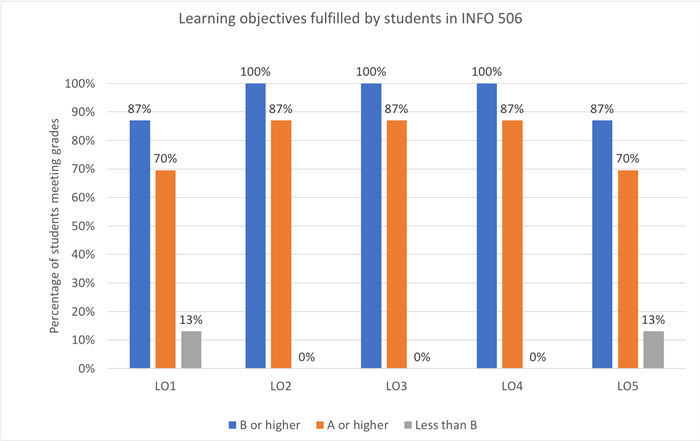LIS Program Assessment 2018-19
The College of Computing & Informatics is a member of the Association for Library and Information Science Education (ALISE). In 2017, the American Library Association reaccredited the Drexel LIS graduate major program with "continuous accreditation" status until 2025. Systematic planning and program learning assessment are an integral part of our program’s ongoing efforts. As explained in our 2017 ALA Accreditation Program Self-Study, we conduct systematic data gathering from our constituencies including students, faculty, alumni, employers and administrators.
The MS in Information LIS Program Learning Objectives are fundamental to our ongoing assessment efforts.
MS in Information LIS program student learning achievement is assessed on a four-year evaluation cycle that ties the MSLIS program outcomes to the ALA competencies and to the core course assignments. The current four-year evaluation cycle began with the fall of academic year 2017/2018, when a new degree program revision was implemented, as described in the 2017 ALA Accreditation Program Self-Study. The program assessment cycle is shown in Table 1.
Table 1: Data collection cycle for MSLIS program learning outcomes assessment.

Program learning outcomes #6 and #7 were evaluated during AY2018/2019, as per the assessment review cycle:
- Program learning outcome #6: Lead and manage information agencies, projects, and people through creative and effective approaches to planning, budgeting, policy making, fundraising, communication, and advocacy.
- Program learning outcome #7: Use research and data in sophisticated ways to demonstrate the value of the library and to help individuals and communities address community challenges (e.g., poverty and hunger, population shifts, economic development, preservation of cultural heritage, etc.).
These two outcomes are addressed in four of the LIS core courses: INFO505: Information Professions and Professionals, INFO506: Users, Services, & Resources, INFO507: Leading and Managing Information Organizations, and INFO591: Data and Digital Stewardship. For each course, we matched assignments to course-level learning objectives and collected anonymized students’ grade data for each assignment.
In the MSLIS grading scale, B or above is a satisfactory grade, and A or above is an excellent grade. For our collected data on INFO505, 6% of students received a grade lower than B and 94% received B or higher grades, with 63% receiving A or higher grades. Figure 1 shows the learning objective (LO) level grade distribution.

Figure 1: Learning objectives fulfilled by students in INFO505.
Thus, all students met LO2, 90% met LO1, 96% met LO3, and 96% met LO4. These results indicate student achievement beyond the 80% benchmark success rate. This course was revised for the current academic year based on student performance in the previous year (see the AY 2017/18 assessment), and these metrics show that the revision was successful in raising student achievement.
For our collected data on INFO506, 89% of students received B or higher grades, with 62% receiving an A or higher. Figure 2 shows the learning objective (LO) level grade distribution for assignments from this course.

Figure 2: Learning objectives fulfilled by students in INFO506.
Thus, 91% of students met LO1 and LO5, and 90% met LO2, LO3, and LO4. These results exceed the desired 80% student achievement benchmark.
For our collected data on INFO507, 81% of students received B or higher grades, with 41% receiving an A or higher. Figure 3 shows the learning objective (LO) level grade distribution for assignments from this course.

Figure 3: Learning objectives fulfilled by students in INFO507.
Thus, all students met LO5, 78% met LO1, 83% met LO2 and LO3, and 98% met LO4. As performance for LO1 was below the desired benchmark of 80% percent student attainment of at least a grade of B, the course coordinator will revise the related course content and delivery methods with the goal of raising student achievement for the next evaluation cycle.
For our collected data on INFO591, 97% of students received B or higher grades, with 63% receiving A or higher grades. Figure 4 shows the learning objective (LO) level grade distribution for assignments from this course.

Figure 4: Learning objectives fulfilled by students in INFO591.
Thus, 84% of students in this course met LO1, 91% met LO2, 97% met LO3, and 94% met LO4. These results indicate student achievement beyond the 80% benchmark success rate.
As such, our systematic program assessment to this point indicates that our learning objective benchmark of at least 80% of students receiving at least a B or higher was surpassed for examined program learning objectives, with the exception of learning objective #1 for INFO507. Systematic assessment continues with the next year of the assessment cycle, AY2019/2020.